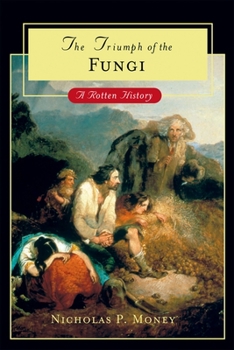The Triumph of the Fungi: A Rotten History
This book is concerned with the most devastating fungal diseases in history. These are the plagues of trees and crop plants, caused by invisible spores that have reshaped entire landscapes and decimated human populations. The Triumph of the Fungi focuses on the fascinating biology of the well- and lesser-known diseases, and also tells the stories of the scientists involved in their study, and of the people directly impacted.
Format:Hardcover
Language:English
ISBN:019518971X
ISBN13:9780195189711
Release Date:August 2006
Publisher:Oxford University Press, USA
Length:216 Pages
Weight:1.05 lbs.
Dimensions:0.8" x 6.4" x 9.4"
Customer Reviews
3 ratings
Laugh While You Learn
Published by Thriftbooks.com User , 16 years ago
Could a book on fungus make you laugh out loud? If the book in question is Dr. Nicholas Money's wonderful The Triumph of the Fungi, it certainly could. I laughed the whole way through, starting with the subtitle - A Rotten History, and learned so much along the way. Each chapter of the book tackled a crop I take for granted, describing how it gained prominence, revealing who it enriched, and delving into what fungus destroyed or has the power to destroy it. Dr. Money tied in the historical aspects of each mycological disaster, making the book easy going, even for a nonscientist. As an English major, I only took two semesters of biology, so it would have been easy to lose me in the details. The numerous real-life examples, comparisons, quips, and allusions, however, made what would have been dry and inaccessible material in another author's hands fresh and fun. Before this book, I knew nothing about how dangerous monocultures are and how at risk current farming practices make us. I had only a glimmer of how complex the life cycles of fungi are. I certainly didn't realize how impossible it is for fungicides to keep up with the rapidity of evolution in the fungal world. And now I do. It took me months to read this book because I'm a teacher and, during the school year, I only get to read in 15-minute "Silent Reading" intervals. This kind of interrupted reading makes even great books take a loooong time to finish. To Dr. Money's credit, the book was so well written that even a sporadic reader found it easy to pick up where she left off and forge on. It's a rare book that entertains as well as it educates; Triumph of the Fungi does just that.
Manifesto against monocultures
Published by Thriftbooks.com User , 17 years ago
Apart from some strained attempts at humour, starting with the subtitle, Nicholas Money has produced an excellent book. The book is a well-organised and expressively written presentation of how various fungi [and their relations] have and are assaulting valuable trees and crops around the planet. With excellent graphics to support the text, the author describes how fungal infections have attacked decorative or lumber tree species, such as the chestnut and jarrah, crop plants like coffee, potatoes and rubber. He explains how the infections were detected and investigated by various researchers and what steps have been taken to curb or eliminate the infestation. The latter point is the one that should prompt the reader's close attention. Although to many people, the blight causing the Irish Potato Famine may be the best known of fungal infections, Money opens with a story of the extermination of the American Chestnut. The account shows how little was known of fungi life cycles at the turn of the last century. Coping with the spreading infection was sporadic and ineffective. The spores, Money calculates, spread at the rate of over 100 metres per day. Small wonder governments failed to address the epidemic successfully. Control, in any case, would have meant an interdict on seed and seedling importation and transport, a multi-million dollar business. Such a draconian imposition would have raised the ire of business and governments alike. So we lost the chestnut. And the elm. The oaks and redwoods in California are presently under threat from a similar infestation. How can microbes be so destructive and apparently so immune to counter-measures? Fungi are insidious in their invasive tactics and are talented breeders. Not only may a species have multiple mechanisms for breeding, many actually breed across species to create hybrids. These cross-bred organisms are highly adaptable to changing conditions. In fact, variations in environment may prompt species' mix to address the change. The breeding of multiple species may have immense impact, since some fungi may infect more than a hundred different types of plants. Money demonstrates mixed feelings as he describes some fungi as "the most exuberant swingers of the microbial world". It's an amazing capacity in such a simple organism. The genome of some species is nearly the size of a human's - but, far more importantly, the large genome imparts the ability to change rapidly as needed. This is one reason why so many fungi aren't "species-specific" in their infections. In his descriptions of the historical efforts to identify the various rusts, blights, blasts and bunts attacking plants, Money recounts the efforts of investigators. There are the losers who went along almost fantastic idea tracks, attributing infections to malodorous mists and even moonlight. More rational researchers found ways of tracking infectors and how they operated. His first hero is Henry Murrill, who strugg
Fantastic book!
Published by Thriftbooks.com User , 18 years ago
It is often said that the cockroaches will outlast us--but Nicholas Money's new book convinces me it will be the fungi who triumph in the end. This wonderful, terrifying book details the devastation wrought by the fungi and our feeble efforts to keep them at bay. How is it possible that a book with such a grim message is a page-turner that makes you laugh out-loud on nearly every page? Because this guy can WRITE. Money is the Steven Jay Gould of mycology, the Richard Dawkins of the fungi, and this book is fantastic.





